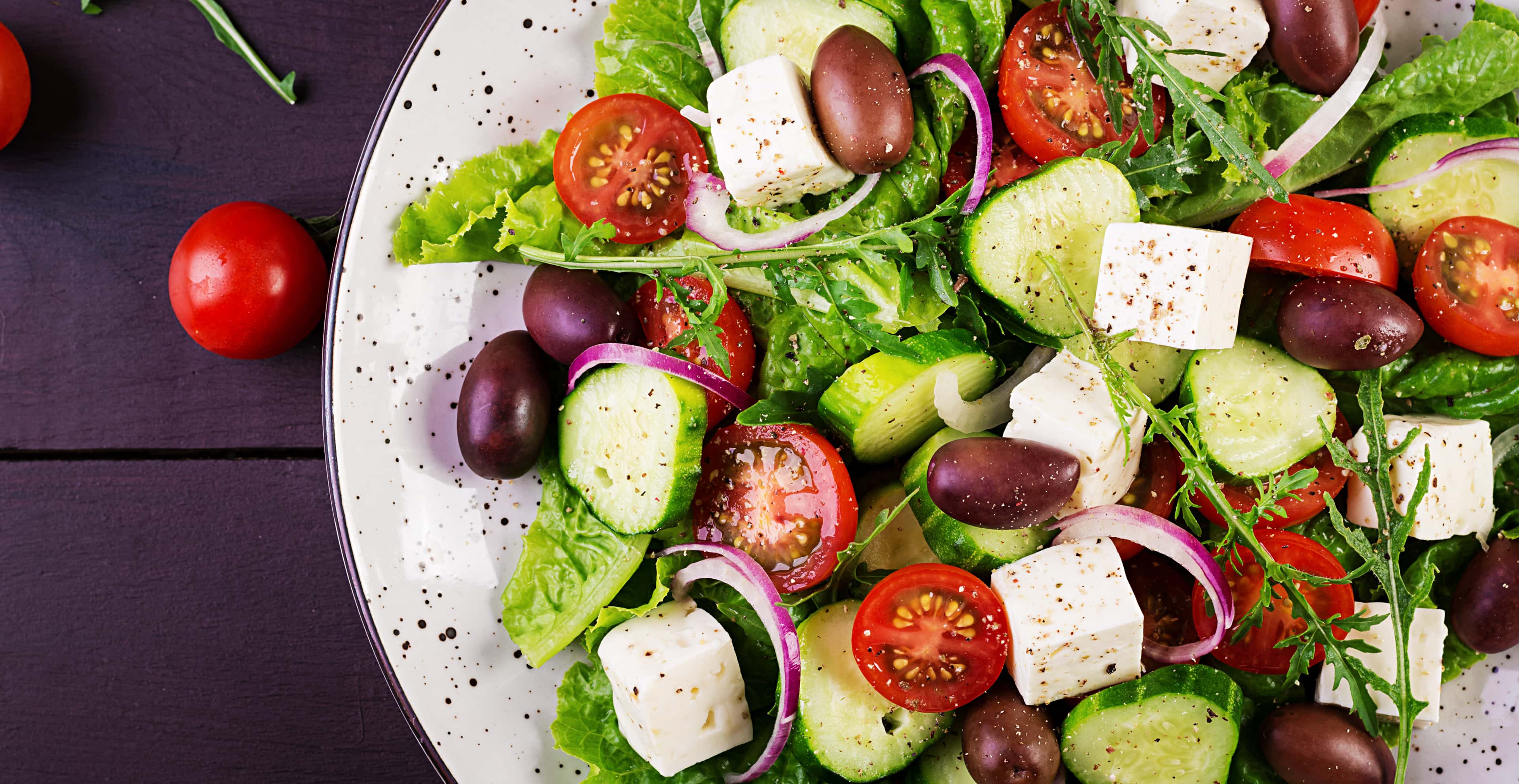Key takeaways
- The post explains the Mediterranean diet as a flexible eating pattern inspired by Mediterranean-region cuisines, centered on whole and minimally processed foods.
- It outlines core principles like using olive oil as the main fat, eating plenty of vegetables, prioritizing seafood, choosing whole grains, and including nuts/seeds and legumes.
- It offers beginner-friendly tips for consistency (starting small, building a pantry, choosing easy meals, meal planning, portion control, and staying active).
- The overall focus is long-term habits and sustainability rather than short-term restriction.
In a world where most diets are simply just trendy eating patterns, the Mediterranean diet stands out. Inspired by the nutritional habits of countries bordering the Mediterranean Sea, such as Italy and Spain, this diet has gained popularity not only for its healthy advantages but also for its flexibility and delicious food options.
The idea behind the Mediterranean diet is not about restrictions but embracing whole and natural foods that promote diverse health benefits and long-term wellness. For a beginner, navigating the Mediterranean diet can be daunting without the right understanding. In this article, we have prepared a comprehensive guide to help beginners transition into the Mediterranean diet smoothly. Here we will discuss how to maximize this diet and provide practical steps to help you boost wellness with the Mediterranean diet.
What is the Mediterranean diet?
The Mediterranean diet is not a strict calorie-counting diet; it is a lifestyle that is focused on the dietary habits of countries that border the Mediterranean Sea. For decades, people who live in this region have enjoyed flavorful meals centered on heart-healthy fats, legumes, whole grains, and vegetables.
Unlike other diets, the Mediterranean diet is rooted in balance and enjoying the flavor of the foods being consumed. It promotes nutrient-dense foods, packed with antioxidants and healthy fats, while discouraging processed foods and excess red meat consumption.
Over the years, the Mediterranean diet has been recommended by many health professionals due to its numerous health benefits. It has been linked to a reduced risk of heart disease, type 2 diabetes, decreased inflammation, weight management, and cognitive decline.
The primary principles to follow for the Mediterranean diet

Starting any diet can feel overwhelming, especially if you do not understand the basics; the good news is that the Mediterranean diet is a lifestyle that is easy to adopt. If you are new to the Mediterranean diet, it is important to focus on adopting the key principles before attempting complex recipes. Here are some essential daily guidelines for starting the Mediterranean lifestyle.
1. Olive oil is the primary fat
Extra virgin olive oil is a cornerstone of the Mediterranean diet. Replace margarine or butter with extra virgin olive oil. Use it for salad dressings, sauté foods in it, and drizzle it over roasted vegetables. Olive oil is rich in monounsaturated fats and diverse antioxidants such as polyphenols that help to decrease inflammation and boost heart health.
2. Consume fresh vegetables
A core principle of the Mediterranean diet is consuming diverse vegetables. They should be the centerpiece of all your meals rather than a side dish. Start by adding steamed vegetables or a side salad to your lunch and dinner. Zucchini, bell peppers, and fresh tomatoes are the main items in Mediterranean cooking.
3. Prioritize seafood
Rather than processed meats, the Mediterranean diet focuses on seafood. Mediterranean meals prioritize fresh fish at least twice per week. Include salmon, sardines, and anchovies in meals. Seafood is a powerhouse of omega-3 fatty acids, healthy fats, and lean protein that promote immune health, lean muscle mass, boost metabolism, and decrease the risk of heart attack and stroke.
4. Opt for whole grains
To follow the Mediterranean diet, replace refined foods with whole foods. Swap white bread, rice, and pasta with whole grains such as brown rice, quinoa, bulgur, and whole wheat bread. Enjoy grains in salads, soups, and dishes. These grains aid the regulation of blood sugar and provide lasting energy.
5. Snack with nuts and seeds
Replace unhealthy snacks with nuts and seeds that are packed with diverse nutrients. Walnuts, pistachios, sunflower seeds, and sesame seeds are excellent choices to consume for the Mediterranean diet. These foods are not only satisfying but also loaded with heart-healthy fats, antioxidants, and fiber. As nuts and seeds are calorie-dense, it is important to manage portion sizes and enjoy them in moderation.
6. Incorporate legumes
Foods that are rich in fiber and protein are important for the Mediterranean diet. Incorporate legumes such as beans, chickpeas, and lentils in stews, soups, and salads, or make them into spreads like hummus, which is a delicious meal in the Mediterranean diet.
7. Enjoy fruits as dessert
For dessert, replace processed sweets with fresh fruits. Fruits like berries, grapes, melons, citrus fruits, and figs are rich in natural sugars, antioxidants, and fiber.
Practical steps and smart tips for consistency with the Mediterranean diet

1. Start small
One main mistake that many people make when starting a new diet is trying to change everything at once. Start by switching out one meal a day and making gradual substitutions such as replacing white pasta with whole grain pasta, and using olive oil instead of butter. Gradual changes are easier to maintain.
2. Build your pantry with Mediterranean essentials
One of the best ways to set yourself up for success on the Mediterranean diet is to start by stocking your kitchen with wholesome and versatile ingredients that support this lifestyle. Your pantry should be packed with foods such as olive oil, whole grains, canned tomatoes, garlic, onions, spices and herbs, nuts and seeds, and legumes.
3. Choose meals that are easy to prepare
It is important not to overwhelm yourself, so start with simple dishes, such as:
- Roasted vegetables with garlic and olive oil
- Grilled chicken with whole grain couscous and grilled zucchini
- Hummus platter with whole grain pita, olives, and raw veggies
- Lentil soup with tomatoes and spices
- Greek salad with tomatoes, cucumber, red onion, olives, and feta
4. Plan weekly meals
Planning meals is the major key to succeeding with the Mediterranean diet. Pick a few recipes for the week and batch cook on weekends or prepare ingredients such as marinated proteins, cooked grains, or chopped vegetables. Cook at home more often, as restaurant meals are often packed with unhealthy fats and excess salt.
5. Practice portion control
The Mediterranean diet is a nutritional habit that primarily focuses on quality and not quantity. Consume foods in moderation, utilize smaller plates, practice mindful eating, stop eating when you feel satisfied, and avoid stuffing your body with food
6. Stay active
The Mediterranean diet is not just about consuming food; it encourages you to stay active. Daily physical activity is important in Mediterranean culture. Engage in diverse physical activities such as biking, swimming, or any movement that you enjoy.
Conclusion
The Mediterranean diet is more than a trendy eating plan; it is a nutritional lifestyle that helps you stay grounded in balance, health, and enjoyment. For newbies, the key to long-term success lies in understanding the primary principles and making gradual but consistent changes. By stocking your pantry, preparing meals ahead, and incorporating delicious whole foods such as salmon, olive oil, and tomatoes, you can enjoy a diet that is not only delicious but also promotes optimal well-being.






